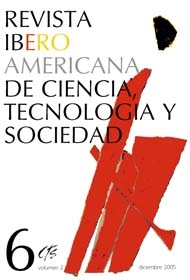Deliberative Democracy and Biotechnological Development
DOI:
https://doi.org/10.52712/issn.1850-0013-1003Abstract
Considering the current times and the directions taken by contemporary scientific and technical research, there is no longer any debate as to whether we live in the biotechnology era. What authors such as J. Rifkin (1999), T. Wilkie (1993), or T.F. Lee (1994) anticipated years ago—that we inhabit the era of biotechnology and the biotech economy—is now a belief reinforced by ongoing research trends, by the most valued stock market indices (NASDAQ), by sensationalist media reports, and by the expectations of a civil society that sees medical biotechnology applications as the ultimate therapeutic panacea.
Downloads
References
ADORNO, T.W.; HORKHEIMER, M. (1998): Dialéctica de la Ilustración, Madrid, Trotta.
DOWNS, A. (1957): An Economic Theory of Democracy, New York, Harper & Row. LEE, T.F. (1994): El proyecto Genoma Humano, Barcelona, Gedisa.
RIDLEY, M. (1996): The Origins of Virtue. Towards a Natural History of Virtue, Harmondsworth: Penguin.
RIFKIN, J. (1999): El siglo de la biotecnología, Barcelona, Crítica.
SCHUMPETER, J. (1971): Capitalismo, socialismo y democracia, Madrid, Aguilar. STOKES, S.C. (2001): “Patologías de la deliberación” en La democracia deliberativa, J. Elster (comp.), Barcelona, Gedisa, pp. 161-181.
SUZUKI; KNUDTSON (1991): Gen-Ética, Madrid, Tecnos.
WILKIE, T. (1993): El conocimiento peligroso, Madrid, Debate.
Downloads
Published
How to Cite
Issue
Section
License
Copyright (c) 2025 CC Attribution 4.0

This work is licensed under a Creative Commons Attribution 4.0 International License.
All CTS's issues and academic articles are under a CC-BY license.
Since 2007, CTS has provided open and free access to all its contents, including the complete archive of its quarterly edition and the different products presented in its electronic platform. This decision is based on the belief that offering free access to published materials helps to build a greater and better exchange of knowledge.
In turn, for the quarterly edition, CTS allows institutional and thematic repositories, as well as personal web pages, to self-archive articles in their post-print or editorial version, immediately after the publication of the final version of each issue and under the condition that a link to the original source will be incorporated into the self-archive.











